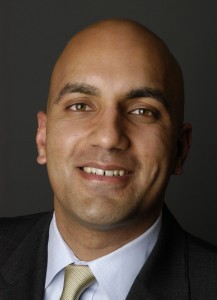Global leaders, technocrats and development pros were in New York City this week to mobilize cash — and action — for the multi-trillion dollar global development agenda known as the Sustainable Development Goals.
[blockquote author=”Amit Bouri, the Global Impact Investing Network” pull=”pullleft”]I thought there was a great risk of impact investing not being seen as part of the solution.[/blockquote]
For his part, Amit Bouri, the CEO of the Global Impact Investing Network, was calling on private investors to get on board with the goals. The call to action — laid out in a post for Institutional Investor — represents the beginning of a new, more active leadership role for the GIIN. The GIIN was launched seven years ago at the Clinton Global Initiative, which held its final meeting this week. ImpactAlpha spoke with a reflective Bouri about why it is time to activate the GIIN’s network around the SDGs.
ImpactAlpha: What’s behind the GIIN’s call on global investors to align investments with the SDGs?
Amit Bouri: The SDGs represent a really critical focus for the global community and how it thinks about building a more just, healthy and sustainable planet. One of the things that was becoming quite apparent to us in the year since the SDGs were launched, was how many members of our network — private investors — were thinking about the SDGs and how to connect them to their investment strategies. I have been to Europe three times in the last few months for a variety of events and conference. What I kept hearing time and time again is the desire to understand how the work of impact investors connects to the broader set of goals set by the leaders of the world.
![Amit Bouri, CEO, The GIIN (photo: Forbes]](http://impactalphainc.wpengine.com/wp-content/uploads/2020/10/b9fa41fc7927abf807f534096e521e80-11.jpg)
What we saw as a clear role for the GIIN was to help build a bridge between SDGs and the way people thought about investment and to really underscore the point that people shouldn’t just think about this as an effort of governments and NGOs but that investment capital will play a critical role in the achievement of the SDGS. It’s important for us at the GIIN to make sure the world beyond our network also appreciates that there is an opportunity to contribute towards achievement of the SDGs through making impact investments.
ImpactAlpha: Why now?
Bouri: It became apparent that there was critical bridge to build between how people think about private investment and these global goals. The reason why we chose this time is that the SDGs are still quite new, we’re at the one-year anniversary of a fifteen year time-frame. But we saw that it was important to help catalyze investment activity towards achieving the SDGs.
So the combination of what we’re hearing from the market, the state of evolution of the SDGs, and the critical opportunity to act now because if we are going to achieve these ambitious goal it’s critical that investors start making impact investments towards achieving the SDGs.
ImpactAlpha: How did you weigh risks and opportunities when launching the campaign?
Bouri: The GIIN needs to play a stronger leadership role in the market. What was clear with this opportunity is that there is a clear need, there’s an ambitious agenda that is fundamental to sustain the world that we want to have and that impact investing is a critical part of the solution.
[blockquote author=”Amit Bouri, the Global Impact Investing Network” pull=”pullleft”]First and foremost for us… we’re a global network, even if the U.S. is not as enthusiastic about a global effort like this, our role is to serve our global community.[/blockquote]
The greatest risk that I saw in terms of weighing this campaign was the risk of inaction. I don’t think we can afford to not make significant progress on towards the SDGs. I thought there was a great risk of impact investing not being seen as part of the solution and that investors themselves not having the role in the achievement of the SDGs. So the reason why we launched the campaign in the way that we did — targeting a broader set of investors, going beyond our core community to help catalyze greater impact investment activity to tap pools of capital that may not be thinking about impact top of mind yet — it was really important for us to start to lay the ground work for the growth of the impact investing market and to make sure the market was really aligned with this global framework.
ImpactAlpha: How can large institutional investors, such as pension funds, help achieve progress toward the SDGs?
Bouri: I’d hope that large financial institutions think about their support of the SDGs in a holistic sense. Impact investing may be one tool in their toolkit when they think about their contributions to the SDGs. For us, the place where we have authority and depth of knowledge and expertise of course is impact investment. That’s why it was critical for us to make sure that we push impact investment up on the agenda for those institutions thinking about the SDGs and hope that they think about how they can support the SDGs and make positive contributions to their communities and health of the planet through every element of their operations. We’re sticking to our knitting with an impact investment angle and I think there’s a huge unrealized opportunity to channel more capital toward achievement of the SDGs through impact investment.

ImpactAlpha: The GIIN’s call to action was framed as “filling the SDG financing gap.” Do the SDGs also represent an investment opportunity?
Bouri: Both of those perspectives are really important. One, that there’s an opportunity to meet your financial objectives and have a tremendous impact through impact investing. That is a message we’ve been carrying since day one and we’ve been trying to educate more investors about how they can build impact investment strategies into their portfolios and be able to achieve their financial objectives and have a tremendous impact on the world.
The SDGS represent a global framework that has been agreed upon by most of the world’s leaders through a very extensive and thorough effort to really set the agenda for what we need to accomplish to build a more sustainable planet. I also think that the times that we’re living in, with what we’re seeing with climate change, rising inequality and political uncertainty, the call for us to go all in on trying to build that sustainable planet has never been greater.
It’s on all of us: Investors, government leaders, leaders of NGOs and private citizens to figure out how we can rise to the challenge and what is the role each of us have in making sure these goals are achieved.
ImpactAlpha: Are there enough investable opportunities for the influx of capital?
Bouri: The pendulum will swing depending on which segment of the market you’re looking at, between too much capital too many deals seeking capital. It really depends on which investors you’re asking and what they’re looking to invest in.
[blockquote author=”Amit Bouri, the Global Impact Investment Network” pull=”pullleft”]It became apparent that there was critical bridge to build between how people think about private investment and these global goals.[/blockquote]
There is a pretty significant information asymmetry between the opportunities on the ground and the investors who are seeking to deploy capital. That’s one of the reason that motivated the development of ImpactBase in first place — to help address that information asymmetry and build the connectivity in the market. So is it matter of supply and demand as opposed to a lack of transparency and visibility into the investment opportunities in the market? There will always be areas where investors are seeking more pipeline and I think that’s inherent to a market. It’ll be uncommon for it to be perfectly matched and to sustain that indefinitely.
ImpactAlpha: The resonance of the SDGs with institutional investors seems to be at the moment stronger in Europe. What are you hearing from the U.S. market?
Bouri: I do think there is greater awareness among European private institutions. I think the SDGs do give a framework that is aligning activity from a broad set of stakeholders, both public and private. Part of the role we can play is to help educate U.S. investors about the opportunity with the SDGs. I don’t know that all of them will feel motivated by them but we can catalyze the movement towards making impact investments to support the SDGs. As that movement starts to build momentum, which is happening already, that it will draw in activity from a broader set of investors including those that are based here in the U.S.
Though we’re based here in New York, we’re a global network. Even if the U.S. is not as enthusiastic about a global effort like this, our role is to serve our global community and so that weighed very heavily in this choice and so far it seems like it’s resonating with a broad set of stakeholders across geographies.
ImpactAlpha: Does this call to action represents a more activist role for the GIIN?
Bouri: The opportunities for impact investing to really change the trajectory of social and environmental progress have never been greater. The market, of course, has its share of challenges.
For us it boils down to: the potential is tremendous and the stakes are higher than ever before. The market and our community have been asking the GIIN, in this phase of development, for much greater leadership and setting the direction and helping to activate the network to overcome challenges in the market. So the SDG campaign is just one example of this, with the need and opportunity to build bridges between impact investing and broader investment community and the global framework that’s been developed by the world’s leaders.
Across the board you’ll be seeing a stronger leadership role from the GIIN, whether it’s on specific activities and tackling some of the thorny challenges that we see in the market or on higher-level thought leadership. It’s an important role for the GIIN to play now to make sure that the impact investment market achieves its full potential and has the impact we all hope it can have.
[seperator style=”style1"]Disclosure[/seperator]
ImpactAlpha’s Jerome Tagger contributed to this interview.
This interview has been edited for clarity.
Feature photo credit: United Nations











